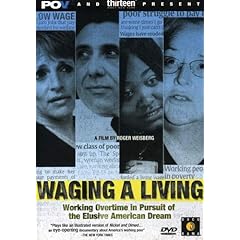By Umut Newbury
November 26, 2006
 Since their victory on Nov. 7, the Democratic leaders have pledged to make raising the minimum wage among their top priorities. If they want to accomplish that goal they should make sure to have all of their Republican colleagues view Roger Weisberg’s Waging a Living before the debates begin.
Since their victory on Nov. 7, the Democratic leaders have pledged to make raising the minimum wage among their top priorities. If they want to accomplish that goal they should make sure to have all of their Republican colleagues view Roger Weisberg’s Waging a Living before the debates begin.
The federal minimum wage has remained at $5.15 per hour since 1997. According to The New York Times, when adjusted for inflation, the buying power of the wage has dropped to its lowest level since 1955. By December, The Times reported recently, the minimum wage will have remained unchanged for the longest period since it was established in 1938.
Weisberg follows four Americans over a period of three years in Waging a Living, three women and one man. Jean Reynolds, a rest home nurse in New Jersey, is recently divorced and is taking care of her children, one of whom is a 29-year-old cancer patient, and her children as well. Jerry Langoria, a security guard in San Francisco earns $12 per hour, but can only afford a small room in a hotel for $530 per month.
Weisberg points out several facts throughout the documentary such as, after 10 years, of those who start in poverty 50 percent stay there. After a divorce, in the year following a man’s standard of living increases by 10 percent while a woman’s decreases by 27 percent. An estimated 18,000 Americans die every year for lack of health insurance.
Mary Venitelli is a waitress in New Jersey, which means she technically earns less than the federal minimum wage, a mere $2.18, because the tips she is supposed to make would make up for the difference. When the film opens, Venitelli has just started her divorce proceedings and appears almost too well off. She lives in a big house and drives a Volkswagen Passat, but she is about to lose both in a short while. She drives to the food pantry for Christmas gifts and food and says, “I was one of those women who used to donate to people like me.†Barbara Brooks, a child care worker in New York is a single mother of five. She earns $8.25 per hour and is trying desperately to get a degree to raise her own earning powers.
In Waging a Living, Weisberg is not telling us that the minimum wage needs to be raised or that universal health care is a must, he is showing us the reality of the situation for working class Americans without either. For Venitelli, that reality involves living on credit cards and having her children act out because she is gone away from home for her job too much. For Langoria, it means that he has to wait nine years to have the financial means to visit his children in North Carolina. For Brooks, it means fearing every raise and promotion, because when she is bumped to $11, she immediately loses her right to food stamps and Medicaid and her housing subsidy drops. For a $450 raise in wages, she loses a total of $600 in government benefits. She knows she is “hustling backwards.†But Brooks keeps fighting. First she gets an associate degree, and 8 months later she returns to school for her bachelor’s. As she puts it, she needs to “be equipped to get out of the system.â€
Yet for every good turn in a working class American’s life, there seems to be a turn for the worse. The daughter of Reynolds, the New Jersey nurse, makes it to her 30th birthday against her doctor’s prognosis, but soon after Reynolds finds out they are being evicted. Langoria finally saves enough money to go visit his children, but five months later he loses his job.
Weisberg’s Waging a Living is a brilliant portrayal of the vicious circle so many working class Americans struggle to leave. His is not political propaganda, it is a simple human interest story that should compel and inspire not only those in Washington, but all of us, to create a better society in which to live.
—–
Directed by Roger Weisberg
2005 Documdrama
Color, 85 minutes



